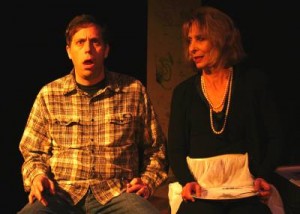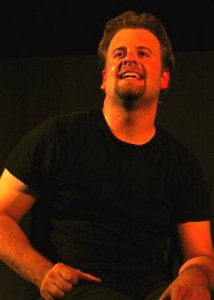The Chance Theatre threw a block party in June and two hundred people
attended. After seven hours of “boisterous fun” and interaction, 100 short
plays were submitted to the Chance, all based on the theme “The Best.” Of
the initial 100, 6 were eventually chosen to make up an evening of theater
entitled Variations on a Theme: The Best.
As might be expected, some of the brief one-acts are more successful and
interesting than others, but at least two of them are really quite special, and
the six plays together offer the cast of six a diverse group of characters to
portray and ample opportunity to show off their versatility.
The hands-down winners among the bunch are the two dramatic pieces.
John Bolen’s Best Chance, Chance Best, directed by Paul Millet, is a deeply
moving portrait of an elderly married couple living with the husband’s
Alzheimer’s and what appears to be the wife’s incipient senility, and the effect
this has on their grown children. David J. Dalton creates an indelible portrait of
a man who can no longer distinguish between past and present, between
real and unreal, and Karen Webster is heartbreaking as his increasingly
forgetful wife. Daniel Berlin and Jennifer Ruckman do fine work as adult
children torn between their love for their parents and the need to do
something about an impossible situation.
Running a close second is Peter Schnake’s one-person Baseball to a Russian,
directed by Katherine Futterer, which affords Chris Raiskup a chance to show
what a fine actor he is. Raiskup is Brian, a wheelchair bound athlete (which he
vividly depicts seated in a straight-back wooden chair) who dreams of playing
baseball. Brian is inspired by three men. The first is his friend Oscar, who is set to
run on prosthetic legs in the Beijing Olympics (in a country where he might not
even have been allowed to live). The second is Lutz Lang, who came in
second to Jesse Owens in the 1936 Berlin Olympics, and who shook Owens’
hand though Hitler refused to. The third is Jim Abbott, who became a
professional baseball pitcher despite having only one arm. (The title comes
from the narrator’s experience of sitting behind a group of Russians at a
baseball game, who wondered, “Do they have to lose an arm to pitch?”) 22-
year-old Shnake, who appears concurrently in Anne of Green Gables: The
Musical, shows real writing talent, and Raiskup is wonderful as Brian.
The other four plays are lighter fare.
Chance member Sarah Moreau’s Alpha Best, directed by Millet, is a clever
experiment. At a sports bar, three guys try to pick up a waitress on a dare, but
instead of hearing their actual words, we hear: “curse word,” “scoff,”
“affirmative statement,” “joyous use of profanity,” “jeering homosexual
suggestion,” “stupid challenge,” etc.
The Best Lie, by John MacDonald, directed by Abraham Celaya features a
group of five friends at a high school reunion discussing, among other “bests,”
their best day, best lover, and most significantly, their best lie. Look-alikes
Ruckman and Lacy Reinbold play the same character, Sandy, now and ten
years earlier, where, at a high school dance, a lie told to the younger Sandy
had a significant impact on today’s Sandy.
The Mingler, by Max Espinoza, directed by Celaya, and Bitches and Cocks, by
Jonathan Josephson, directed by Futterer, are significantly less successful
efforts, though it is fun seeing Webster, Ruckman, and Reinbold as female dogs
in workout gear and Dalton and Berlin with peacock feathers in the latter
piece.
The design team is, as can be expected, first rate: set by Futterer, lighting by
Masako Tobaru, sound by Mitchell Kohen, and production design by John
MacDonald.
Variations on a Theme: The Best is an interesting experiment, with two
especially rewarding pieces of writing, and some very good acting.
The Chance Theater, 5552 E. La Palma Ave., Anaheim.
www.chancetheater.com
–Steven Stanley
November 25, 2007
Photos: Doug Catiller




 Since 2007, Steven Stanley's StageSceneLA.com has spotlighted the best in Southern California theater via reviews, interviews, and its annual StageSceneLA Scenies.
Since 2007, Steven Stanley's StageSceneLA.com has spotlighted the best in Southern California theater via reviews, interviews, and its annual StageSceneLA Scenies.







 COPYRIGHT 2024 STEVEN STANLEY :: DESIGN BY
COPYRIGHT 2024 STEVEN STANLEY :: DESIGN BY